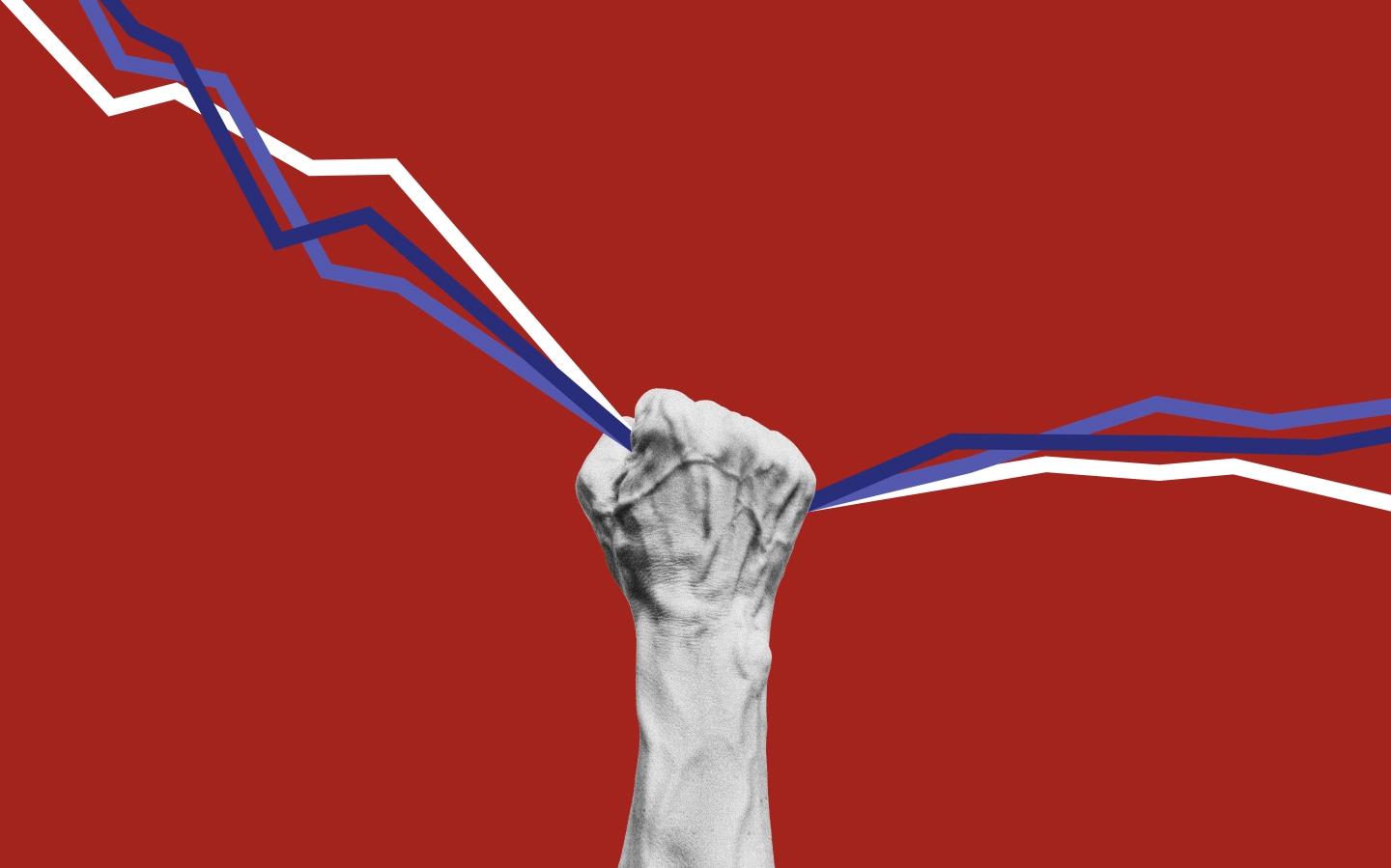
科技初创公司喜欢把自己的成功描述为适者生存。但即便是某一物种的弱者也能够在富饶的环境中生存下来。如今,随着资金枯竭和商业环境变得日益严峻,创业顾问萨姆·王说,创始人必须磨练新技能,否则企业就会消亡。
为了阐明自己的观点,他引用了19世纪的作家拉迪亚德·吉卜林的短篇小说《瑞奇-提奇-嗒喂》(Rikki-Tikki-Tavi),故事中的獴为了保持力量和敏捷性,控制自己不吃饱饭。
同样的教训也适用于初创公司。《创业成功的21个秘密》(21 Secrets of Successful Startups)一书的作者王告诉《财富》杂志:“保持饥饿而不是像肥猫一样感到舒适是有一定价值的。”
“检验一家公司成功与否的标准不是‘我能否在2020年和2021年获得持续增长的估值和更多轮融资?’因为过去,所有人都只注重估值和融资。这要容易得多。”王说。“衡量一家公司成功与否的标准是,你如何在困难时期生存下来?”
这是整个硅谷创始人都在迎接的考验。随着利率飙升和俄乌冲突扰乱市场,曾经在硅谷自由流动的资金急剧放缓。
GoPuff、Patreon和Instacart等曾经风靡一时的初创公司的估值已经从新冠疫情时期的高值大幅下跌。而像Snyk、Patreon和Twilio这样的公司已经裁员以削减成本。
王在过去20年里曾经在多家初创公司工作过,其中包括被思科(Cisco)收购的数据中心管理公司Cloupia。他于2022年在科技网站TechCrunch组织的旧金山会议上与焦虑的初创公司员工进行了交谈。在后来接受《财富》杂志采访时,他分享了自己对初创公司的一些建议。
王表示,初创公司需要开发一种稳健的财务模型,可以根据不同的经济状况进行调整。他提出了四个等级:激进的、温和的、保守的和应对灾难的。
“大多数创始人创建的财务模型只是为了在融资演讲稿幻灯片里填写所需内容。一旦他们筹集到资金,他们就再也不会看这个模型了。”王说,“聪明的创始人明白要积极主动地利用财务模型。”
王认为,在公司裁员的时候,专注于组建合适的团队尤为重要。高瞻远瞩的人才战略会带来优秀的团队,这样团队执行力就会变强,从而有助于公司实现融资。
“每个人都在口头上支持团队建设;但很少有人在这方面投资。”王说。“我见过雄心勃勃的创业想法,但团队成员资质平平,导致创业失败,我也见过公司很平庸,但有非常出色的团队,从而创业成功的案例。”
减少噪音
源于2008年上一次全球经济衰退的硅谷流行说法是,最好的初创公司都是在经济衰退时期成立的。爱彼迎(Airbnb)和Square通常被誉为经济低迷时期的创新巅峰,因为这两家久经考验的初创公司足够灵活,能够在上一次经济危机中幸存下来。
乐观的风险投资家经常重复这句格言。然而,这可能更像是一厢情愿,而非现实。是的,巨大的动荡带来巨大的机遇,这在一定程度上是事实,但王表示,这并不意味着该公司正在进行彻底变革。
“这可能是因为竞争减少了。”王说。“而那些实力雄厚且将脱颖而出的公司只会因为竞争者减少而更加突出。我是否认为经济衰退一定会造就卓越的公司?我不这么认为,它只是减少了噪音而已。”
很容易就可以找到企业消亡的例子。一键支付初创公司Fast就是一个特别好的例子,这家公司“像喝醉的水手一样”花钱如流水,最终不得不在4月倒闭。另一个例子是电动汽车制造商Canoo,该公司于2020年年底上市,5月表示“严重怀疑”其是否能够继续运营下去。
据王表示,这是一次必要的市场修正。他警告道,那些花光了现金、没有为经济低迷时期做好准备的公司将被淘汰出局。那些未能为最坏的情况做好准备,也没有使用全面的财务模型尽其所能地保存现金的公司,很可能也无法在经济低迷时期幸存下来。
“在风投界,已经有三到五年的狂热繁荣了。”王说。“我认为出现这样的修正是好事。希望创始人可以意识到,这不仅仅是签订下一份投资条款清单的问题,而是要打造一家卓越的公司。”(财富中文网)
译者:中慧言-王芳
科技初创公司喜欢把自己的成功描述为适者生存。但即便是某一物种的弱者也能够在富饶的环境中生存下来。如今,随着资金枯竭和商业环境变得日益严峻,创业顾问萨姆·王说,创始人必须磨练新技能,否则企业就会消亡。
为了阐明自己的观点,他引用了19世纪的作家拉迪亚德·吉卜林的短篇小说《瑞奇-提奇-嗒喂》(Rikki-Tikki-Tavi),故事中的獴为了保持力量和敏捷性,控制自己不吃饱饭。
同样的教训也适用于初创公司。《创业成功的21个秘密》(21 Secrets of Successful Startups)一书的作者王告诉《财富》杂志:“保持饥饿而不是像肥猫一样感到舒适是有一定价值的。”
“检验一家公司成功与否的标准不是‘我能否在2020年和2021年获得持续增长的估值和更多轮融资?’因为过去,所有人都只注重估值和融资。这要容易得多。”王说。“衡量一家公司成功与否的标准是,你如何在困难时期生存下来?”
这是整个硅谷创始人都在迎接的考验。随着利率飙升和俄乌冲突扰乱市场,曾经在硅谷自由流动的资金急剧放缓。
GoPuff、Patreon和Instacart等曾经风靡一时的初创公司的估值已经从新冠疫情时期的高值大幅下跌。而像Snyk、Patreon和Twilio这样的公司已经裁员以削减成本。
王在过去20年里曾经在多家初创公司工作过,其中包括被思科(Cisco)收购的数据中心管理公司Cloupia。他于2022年在科技网站TechCrunch组织的旧金山会议上与焦虑的初创公司员工进行了交谈。在后来接受《财富》杂志采访时,他分享了自己对初创公司的一些建议。
王表示,初创公司需要开发一种稳健的财务模型,可以根据不同的经济状况进行调整。他提出了四个等级:激进的、温和的、保守的和应对灾难的。
“大多数创始人创建的财务模型只是为了在融资演讲稿幻灯片里填写所需内容。一旦他们筹集到资金,他们就再也不会看这个模型了。”王说,“聪明的创始人明白要积极主动地利用财务模型。”
王认为,在公司裁员的时候,专注于组建合适的团队尤为重要。高瞻远瞩的人才战略会带来优秀的团队,这样团队执行力就会变强,从而有助于公司实现融资。
“每个人都在口头上支持团队建设;但很少有人在这方面投资。”王说。“我见过雄心勃勃的创业想法,但团队成员资质平平,导致创业失败,我也见过公司很平庸,但有非常出色的团队,从而创业成功的案例。”
减少噪音
源于2008年上一次全球经济衰退的硅谷流行说法是,最好的初创公司都是在经济衰退时期成立的。爱彼迎(Airbnb)和Square通常被誉为经济低迷时期的创新巅峰,因为这两家久经考验的初创公司足够灵活,能够在上一次经济危机中幸存下来。
乐观的风险投资家经常重复这句格言。然而,这可能更像是一厢情愿,而非现实。是的,巨大的动荡带来巨大的机遇,这在一定程度上是事实,但王表示,这并不意味着该公司正在进行彻底变革。
“这可能是因为竞争减少了。”王说。“而那些实力雄厚且将脱颖而出的公司只会因为竞争者减少而更加突出。我是否认为经济衰退一定会造就卓越的公司?我不这么认为,它只是减少了噪音而已。”
很容易就可以找到企业消亡的例子。一键支付初创公司Fast就是一个特别好的例子,这家公司“像喝醉的水手一样”花钱如流水,最终不得不在4月倒闭。另一个例子是电动汽车制造商Canoo,该公司于2020年年底上市,5月表示“严重怀疑”其是否能够继续运营下去。
据王表示,这是一次必要的市场修正。他警告道,那些花光了现金、没有为经济低迷时期做好准备的公司将被淘汰出局。那些未能为最坏的情况做好准备,也没有使用全面的财务模型尽其所能地保存现金的公司,很可能也无法在经济低迷时期幸存下来。
“在风投界,已经有三到五年的狂热繁荣了。”王说。“我认为出现这样的修正是好事。希望创始人可以意识到,这不仅仅是签订下一份投资条款清单的问题,而是要打造一家卓越的公司。”(财富中文网)
译者:中慧言-王芳
Tech startups love to depict their success as the survival of the fittest. But even the weakest member of a species can survive in a bountiful environment. Now, as funding dries up and business conditions get harsh, startup adviser Sam Wong says founders must hone new skills—or perish.
To illustrate his point, he turns to a 19th-century short story by Rudyard Kipling called “Rikki-Tikki-Tavi,” in which a mongoose refrains from eating a full meal so as to preserve its strength and agility.
The same lesson applies to startups. “There is some value to staying hungry instead of feeling comfortable like a fat cat,” Wong, the author of the book 21 Secrets of Successful Startups, told Fortune.
“The test of a good company is not ‘Can I get continually increasing valuations and more rounds of funding in 2020 and 2021?’, because everybody was. It was much, much easier,” Wong said. “The measure of a good company is, how do you survive when it’s hard?”
It’s a test founders throughout Silicon Valley are bracing for. Funding that once flowed freely through Silicon Valley has slowed sharply, as interest rates jump and the war in Ukraine rattles the markets.
Once-high-flying startups like GoPuff, Patreon, and Instacart have seen their valuations take a tumble from their pandemic peaks. And companies like Snyk, Patreon, and Twilio have laid off staff to cut costs.
Wong, who has worked at several startups over the past two decades including Cloupia, a data center management firm that was acquired by Cisco, recently spoke to anxious startup employees at a San Francisco conference organized by the tech site TechCrunch. He shared some of his advice for startups in a later conversation with Fortune.
According to Wong, startups need to develop a robust financial model that can be adjusted for different economic conditions. He suggests four levels: aggressive, moderate, conservative, and disastrous.
“Most founders only create a financial model to fill in a required slide on their pitch deck. Once they’ve raised funds, they never look at the model again,” Wong said. “Smart founders know to leverage the financial model proactively.”
And at a time when companies are laying off staff, Wong says, focusing on having the right team in place is especially important. A great talent strategy leads to great teams, which drives great execution, which results in a fundable company.
“Everybody pays lip service to the team aspect; very few people invest in it,” Wong said. “I have seen great startup ideas with mediocre teams fail, and I’ve seen mediocre companies with fantastic teams succeed.”
Thinning out the noise
A Silicon Valley trope, originating from the last global recession in 2008, is that the best startups are founded in a recession. Airbnb and Square are commonly hailed as the pinnacle of innovation in a downturn because the battle-hardened startups were nimble enough to survive the last economic crash.
Optimistic venture capitalists frequently repeat this adage; yet it may be more wishful thinking than reality. Yes, there is some truth that with great turmoil comes great opportunity, but Wong says that doesn’t mean the company is doing something revolutionary.
“It just might be that’s because there’s less competition,” Wong said. “And the companies that are strong and are going to make it just stand out more because the crowd is thinner. Do I necessarily think that a recession creates great companies? No, it just thins out the noise.”
Evidence of the uprooting is already easy to find. One-click-checkout startup Fast was a particularly good example of a company that spent cash “like drunken sailors” and ultimately had to shut down in April. Another instance is electric car manufacturer Canoo, which went public in late 2020, stating in May that it had “substantial doubt” about its capacity to continue operating.
According to Wong, this is a necessary market correction. The companies that burned through their cash and failed to prepare for the downturn are going to be weeded out, he warns. Those who fail to prepare for the worst-case scenario, and don’t conserve cash as diligently as possible using thorough financial models, likely will not survive the downturn either.
“In the venture community, it’s been three to five years of wild exuberance,” Wong said. “I think having a correction like this is good. Hopefully, founders will realize that it’s not just about closing the next term sheet. It’s about building a great company.”






